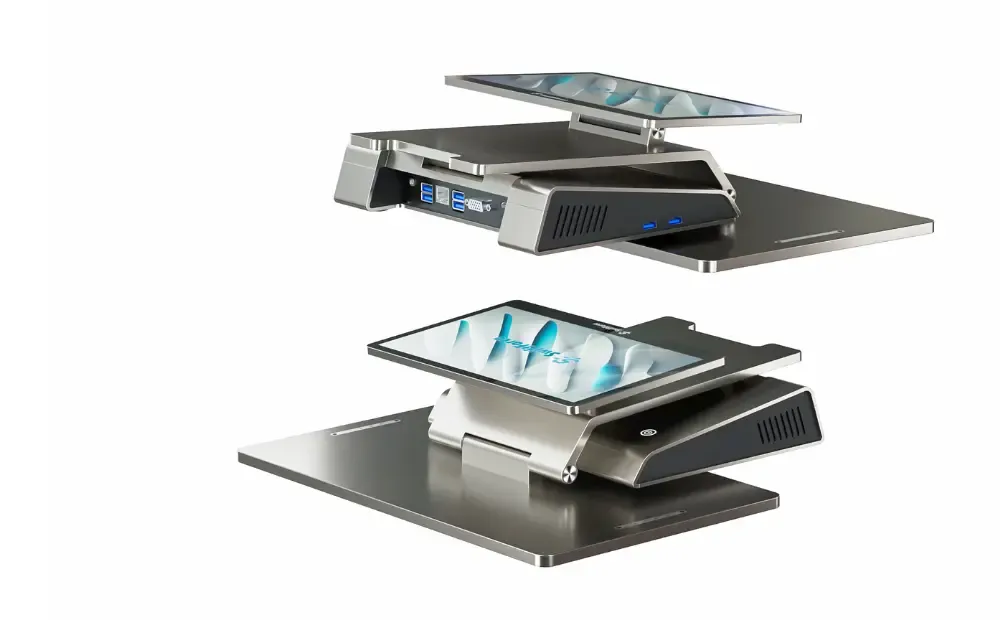Every POS terminal on a busy counter lives a rough life. Cashiers slam drawers. Customers press screens. Cleaning crews use harsh chemicals to wipe surfaces. The outer shell takes all the stress. If the body bends or scratches, the machine loses reliability and appeal.
Pure aluminium delivers a lightweight frame. But it struggles with impact and prolonged use. Aluminium alloy resists dents and provides greater rigidity. This difference goes beyond the technical label on a spec sheet. It shapes reliability and influences customer perception. It also determines how long a business can use the system before needing replacement.
The Difference Between Aluminum & Aluminum Alloy in POS Machine Design

POS body materials define durability, cost, and reliability. Aluminum and aluminum alloy may look similar from the outside. However, they perform very differently within high-traffic retail systems. Understanding their properties helps buyers and IT managers choose the right option for long-term value.
Pure Aluminum: Lightweight but Limited Strength
Aluminum is popular for its light weight and natural resistance to corrosion. It is affordable and easy to shape, which makes it useful in consumer devices.
The weakness is its softness. Pure aluminum dents and scratches under repeated contact. For desktop POS machines that see hundreds of daily interactions, this softness can shorten the service life.
Aluminum Alloys: Built for Durability
Alloys combine aluminum with magnesium, silicon, or zinc. These elements increase hardness, tensile strength, and wear resistance.
The result is a material that stays strong under stress but remains light. Alloys also resist fatigue, which is crucial for foldable or hinged POS designs. In practice, that means fewer repairs, longer uptime, and a polished look even after years of use.
Why POS Machines Need Alloys, Not Pure Aluminum

Consumer laptops or tablets can rely on pure aluminum because they face lighter workloads. A desktop POS PC in a restaurant or retail store does not. It operates continuously throughout the day, often in harsh conditions, as noted by the National Retail Federation on technology in high-demand retail environments.
Alloys provide the structural integrity needed for this environment. Research from the Aluminum Association confirms that aluminum alloys offer higher strength, durability, and longer lifespans compared to pure aluminum. They need less maintenance, which saves money over time. That’s why alloys give buyers a more substantial ROI.
A Quick Comparison of Aluminum vs. Aluminum Alloy for POS Machines
| Property | Pure Aluminum | Aluminum Alloy |
|---|---|---|
| Strength | Low | High |
| Hardness | Soft | Harder |
| Weight | Very light | Light |
| Lifespan | Shorter | Longer |
| Cost | Lower upfront | Higher upfront, lower lifetime cost |
Material Demands in Desktop POS Environments
POS systems work harder than most business hardware. They face constant handling, physical impact, and environmental stress.
That’s why the body material of a desktop POS system matters. It affects durability and customer perception.

1. Daily Stress Factors
A desktop POS does not sit idle. It is touched hundreds of times per day by staff and customers. It is designed for use in environments where drinks spill, steam rises, and potent cleaning agents are used. With a compact footprint, these machines are also more likely to be knocked over or dropped.
Each factor directly impacts the strength and resilience of the POS body material.
2. Business Contexts That Magnify the Pressure
The stress multiplies in industries where speed and reliability matter most:
- Retail counters: High-touch terminals exposed to shopping bags, coins, and regular cleaning.
- Hospitality venues: Machines near food, drinks, and frequent staff turnover.
- Quick-service restaurants: Heat, grease, and fast-paced interactions in tight spaces.
These environments test whether the POS body can withstand frequent repairs or replacements.
3. Why Material Choice Matters for Buyers
The right material is not about looks alone. It influences:
- Durability and maintenance cycles: Stronger bodies reduce repair frequency and extend service life.
- Brand image: A solid, premium-looking unit supports trust and professionalism at the counter.
- Operational downtime: Breakdowns cost sales and disrupt workflows. A resilient body helps prevent these losses.
B2B buyers favor aluminum alloys for strength, aesthetics, and cost efficiency. Alloys give businesses better strength, looks, and savings than consumer aluminum.
For B2B use, aluminum alloys balance durability, design, and lower costs.
The choice of body material is, therefore, a direct business decision. And it’s not just a technical nuance.
Aluminum vs. Aluminum Alloy in POS PC Applications
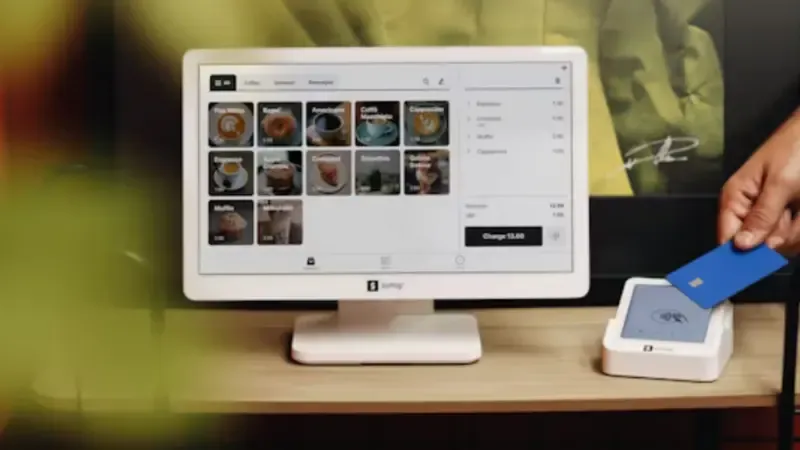
The choice between aluminum and alloy shapes how a POS terminal handles stress. Both materials have strengths. Their differences matter most in business settings. Uptime, durability, and service life directly affect profitability.
1. Aluminum in POS Machines
Aluminum is a popular option because it is light, affordable, and easy to shape. It gives terminals a clean and modern look that appeals in many settings. For small-scale or lower-traffic businesses, this material can be good enough.
The drawbacks are apparent. Aluminum is softer than alloys and picks up dents or scratches quickly. Under heavy use, it loses its structural integrity more quickly. This means more repairs, cosmetic wear, and shorter device lifespan.
2. Aluminum Alloy in POS Machines
Alloys use engineered blends such as aluminum with magnesium, silicon, or zinc. These combinations deliver higher tensile strength and stronger resistance to deformation, as explained by the U.S. Geological Survey.
Precision machining is another advantage. Alloy parts support foldable designs, hinge joints, and compact enclosures without compromising strength. This allows manufacturers to build sleek yet rugged POS machines. The only drawback is the cost, which is higher than that of standard aluminum.
3. Why Alloys Win in High-Demand Environments

Retail counters, restaurants, and quick-service operations rely on POS hardware that can withstand constant handling, spills, and cleaning.
In these settings, aluminum alloys often justify the extra cost. They reduce the risk of premature failures, extend the machine’s life, and keep downtime costs low. For buyers, this translates into better total cost of ownership.
4. Decision Matrix for Buyers
Aluminum works well for low-traffic shops or small offices. It suits businesses where POS machines face minimal stress.
Alloy fits busy retail, hospitality, and restaurant settings. It handles nonstop use and frequent knocks, spills, or drops.
In practice, the difference shows in long-term stability. Aluminum cuts upfront costs. Alloys give better resilience and value than standard aluminum.
Why SwiftForce Uses Aluminum Alloy for POS Machines

SwiftForce is a premium POS hardware manufacturer. That reputation depends on material choices that hold up in real-world conditions.
For desktop POS PCs, SwiftForce uses aluminum alloy, not standard aluminum. The choice improves durability and strengthens business outcomes.
1. Built for Structural Integrity
Many SwiftForce terminals feature foldable mechanisms, hinges, or adjustable stands. Alloy delivers the tensile strength needed for these moving parts to operate smoothly over years of daily use.
Standard aluminum would wear or deform too quickly under the same load.
2. Resilience in Demanding Environments
Retail counters, restaurants, and service desks expose POS hardware to knocks, spills, and continuous handling.
Alloy enclosures resist dents and scratches better, keeping machines operational and presentable even under constant stress.
3. Design without Compromise
SwiftForce machines combine sleek profiles with rugged performance. Alloys allow precise machining and thinner walls without losing strength.
The result is hardware that looks modern on the counter while remaining structurally solid.
4. ROI for Buyers
Every breakdown or repair costs time and revenue. Alloy construction extends service cycles, reduces downtime, and minimizes replacement needs.
For buyers, that means lower ownership costs and stronger returns. For SwiftForce, alloy use is not cosmetic. It is a deliberate choice.
The decision aligns engineering quality with businesses that demand reliable POS systems.
Spotlight: SwiftForce Eva-S01 Foldable POS
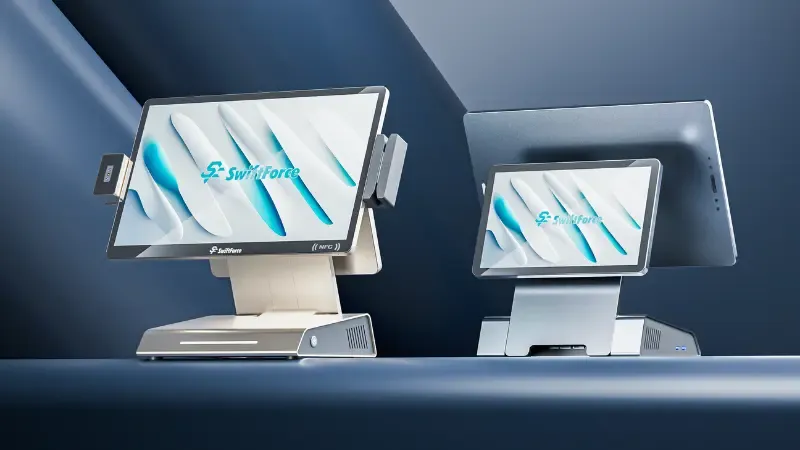
The SwiftForce Eva-S01 shows how alloy engineering creates business value. It is more than a POS machine with a sleek profile.
It is foldable and high-performance, built to survive retail and hospitality. On the counter, it projects a strong and premium brand image.
Aluminum Alloy Backbone
The Eva-S01 enclosure uses an aluminum alloy body. That decision gives the terminal a stronger frame than pure aluminum. It still keeps a lightweight profile.
The alloy shell resists dents, scratches, and daily wear. The machine will still maintain a professional-looking finish long after cheaper aluminum models lose their finish.
For businesses, this means less maintenance and longer deployment cycles.
Foldable, Space-Saving Design
Counter space is expensive in restaurants, shops, and cafés. The Eva-S01 features a foldable design that allows flexible placement in tight spaces.
Alloy-reinforced hinges keep the folding smooth and reliable. They endure repeated daily adjustments without strain.
Staff can tilt or fold the unit for ergonomic use with ease.
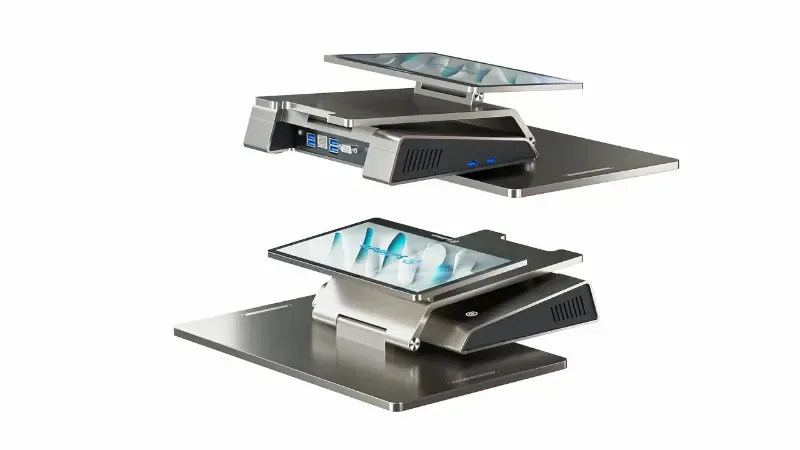
Cross-Platform Flexibility
SwiftForce built the Eva-S01 to fit into diverse IT setups. Buyers can run it on Windows or Android.
This provides system integrators with flexible options for matching existing software. Intel® processors up to 3.60 GHz power the device.
It supports up to 32GB DDR4 memory and 512GB SSD storage. The system handles modern POS workloads with ease.
Premium Look That Enhances Brand Image
Available in Champagne Silver, Space Gray, Baby Blue, and Dark Grayish Blue, the Eva-S01 offers more than just durability.
The slim, minimalist chassis and full HD touch display with ultra-narrow bezels create a modern retail aesthetic.
For chains competing on customer experience, the hardware itself becomes part of the brand impression.
Research on retail design shows that hardware influences customer impressions and brand loyalty.
Why It Outperforms Entry-Level Devices
Entry-level aluminum-only POS machines can appear sleek at first, but wear down quickly under constant stress.
The Eva-S01 combines alloy strength with ergonomic design and flexible setup. It gives buyers durability, style, and reliable performance in one unit. For distributors and IT managers, it proves that SwiftForce builds premium POS hardware. The device is engineered for long-term use in demanding business environments.
Buyer’s Checklist: Choosing the Right POS Material
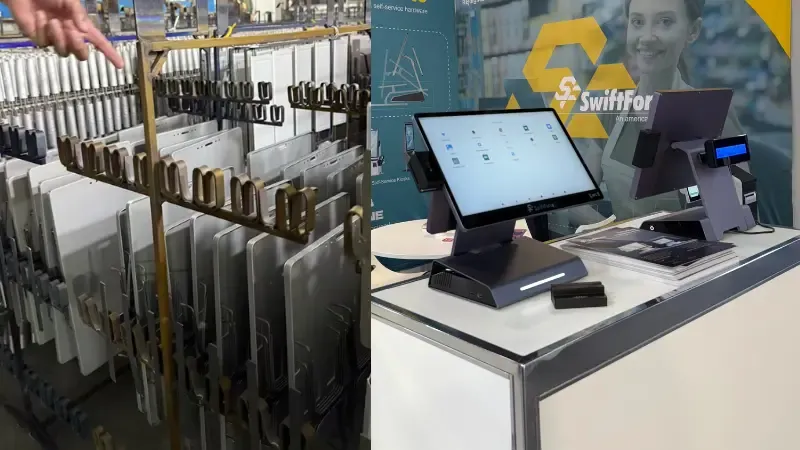
Selecting the right POS body material is not just a technical choice.
It determines how well the system performs under daily stress, how often it needs to be replaced, and how professional it looks on the counter.
For IT managers and distributors, the decision comes down to aligning material with business priorities.
Key Factors to Weigh
- Budget vs. Durability
Pure aluminum is cheaper up front but wears faster. Aluminum alloy costs slightly more but saves money in reduced replacements and service calls.
- Expected Device Lifecycle
If the business plans for a three-year refresh, aluminum can be acceptable. For five to seven years of reliable service, alloy provides the required strength and stability.
- Environment Intensity
Boutique shops with light traffic may tolerate aluminum. Quick-service restaurants, supermarkets, and high-volume retail demand the resilience of alloy.
Takeaway for Buyers
When evaluating desktop POS body materials, think beyond purchase price. Aluminum alloy gives durability, a premium look, and long-term ROI for busy retail and hospitality. Standard aluminum works for short-term or budget setups. But for businesses that value strong POS PCs and reliable performance, alloys are the smarter investment.
FAQs About Aluminum Vs. Aluminum Alloy
Is pure aluminum durable enough for desktop POS PCs?
Pure aluminum can handle light use, but it dents and scratches more easily. For busy retail counters, it often requires earlier replacement.
Why are aluminum alloys stronger than pure aluminum?
Alloys combine aluminum with elements like magnesium or silicon. These blends increase hardness, resistance to bending, and overall wear life.
What’s the expected lifespan of an aluminum alloy POS machine?
With proper use, an aluminum alloy POS can serve five to seven years in high-traffic environments, longer than most aluminum-only models.
Are foldable POS machines less durable than fixed ones?
Not when built with reinforced alloys. Hinges and joints made from aluminum alloy ensure foldable designs remain reliable even under daily adjustments.
Why is SwiftForce Eva-S01 considered premium hardware?
It combines an alloy body, a foldable design, and a high-performance platform. The result is a POS system that looks professional and withstands demanding retail use.
Final Take: Match Your POS Materials to Your Business Demands
Retail and hospitality operations demand more than entry-level aluminum POS machines. An aluminum alloy POS provides the strength, reliability, and polished image required in high-traffic environments.
SwiftForce answers this demand with the POS Eva-S01, a foldable, premium-grade solution designed for long service life.
Call to Action
Discover how the Eva-S01 can enhance your product lineup and operations. Visit our Home page to explore more innovative POS solutions, or Contact Us today to schedule a live demonstration with our team.

